Why Alternative Containers Are Essential for Modern Cremation Services
Alternative containers are required cremation vessels made from combustible materials like cardboard or reinforced fiberboard, designed to meet Federal Trade Commission regulations while providing dignity and affordability for families choosing cremation.
Quick Reference for Alternative Containers:
- Definition: Metal-free cremation containers required by law when no casket is purchased
- Materials: Cardboard, reinforced fiberboard, or wood-based construction
- Cost Range: $0-$315 (often included with basic cremation services)
- Purpose: Provides dignified transport and cremation while meeting regulatory requirements
- Features: Leak-resistant liners, carrying handles, optional personalization
The cremation rate in America continues climbing toward 60%, making alternative containers more important than ever for funeral directors. These simple yet dignified containers solve a basic problem: how do you transport and cremate human remains safely and respectfully without the expense of a traditional casket?
The answer lies in smart engineering. Modern alternative containers use materials like corrugated cardboard and reinforced fiberboard that burn cleanly while providing structural integrity. Popular models like the TransPorter® (the #1 selling alternative container in the US) and Batesville's Trayview® series show how manufacturers have liftd these products from basic boxes to thoughtfully designed vessels that families can personalize and funeral homes can rely on.
Whether you're looking to meet FTC requirements, reduce costs for families, or find sustainable cremation options, understanding alternative containers helps you serve clients better while running a more efficient operation.
As American Mortuary Coolers, we've worked with funeral homes nationwide to optimize their cooling and handling systems, including proper storage solutions for alternative containers before cremation services. Our experience helping funeral directors streamline operations has shown us how the right container choice impacts both family satisfaction and operational efficiency.
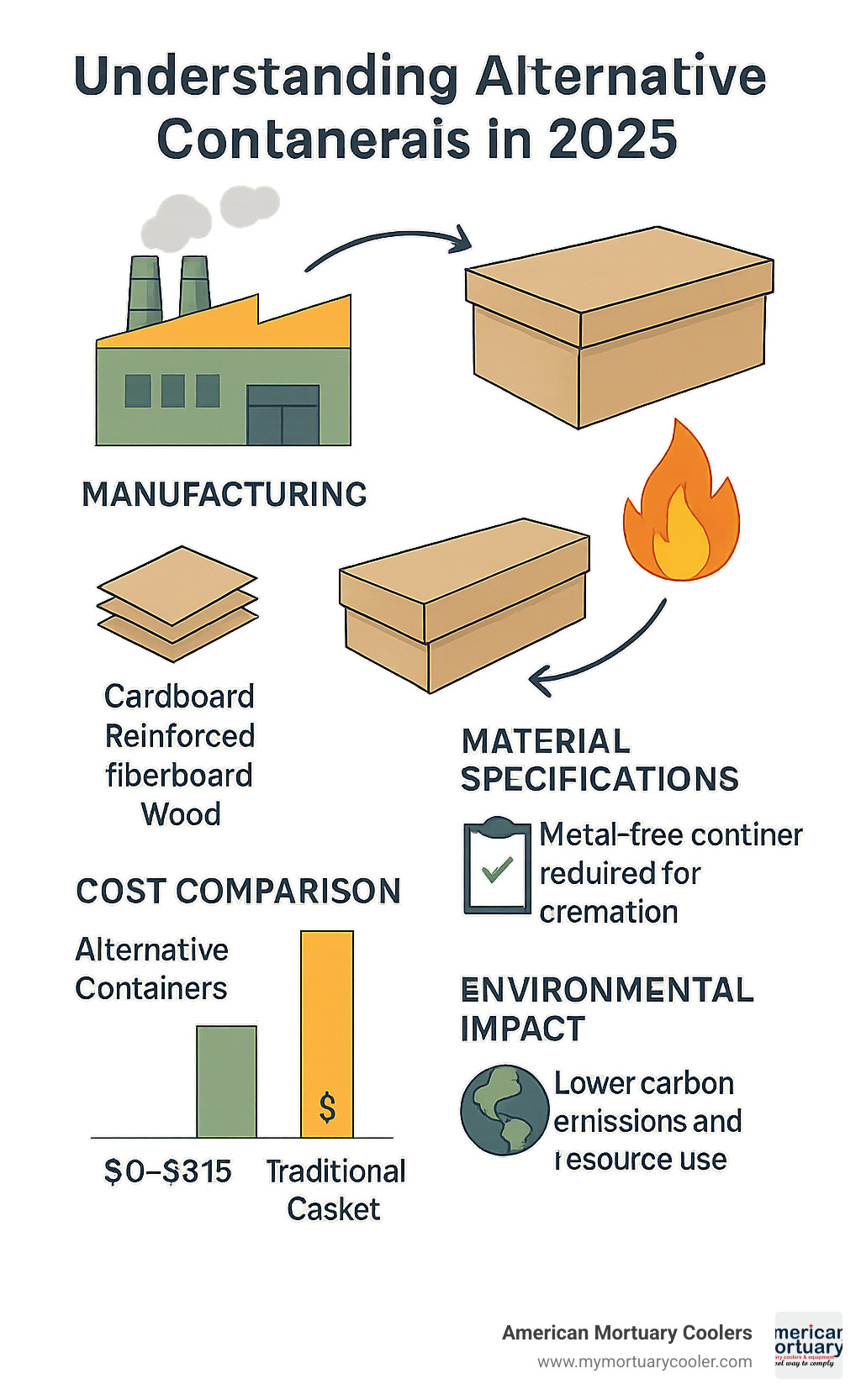
Understanding Alternative Containers in 2025
When families choose cremation, they need a way to transport their loved one to the crematory with dignity and respect. That's where alternative containers come in - they're the practical, compassionate solution that bridges the gap between necessity and affordability.
An alternative container is simply the minimum standard required by law for cremation when a family doesn't purchase a traditional casket. The Federal Trade Commission's Funeral Rule requires funeral homes to offer these containers and explain this option clearly to every family. It's not about compromising on dignity - it's about giving families meaningful choices about how they honor their loved ones.
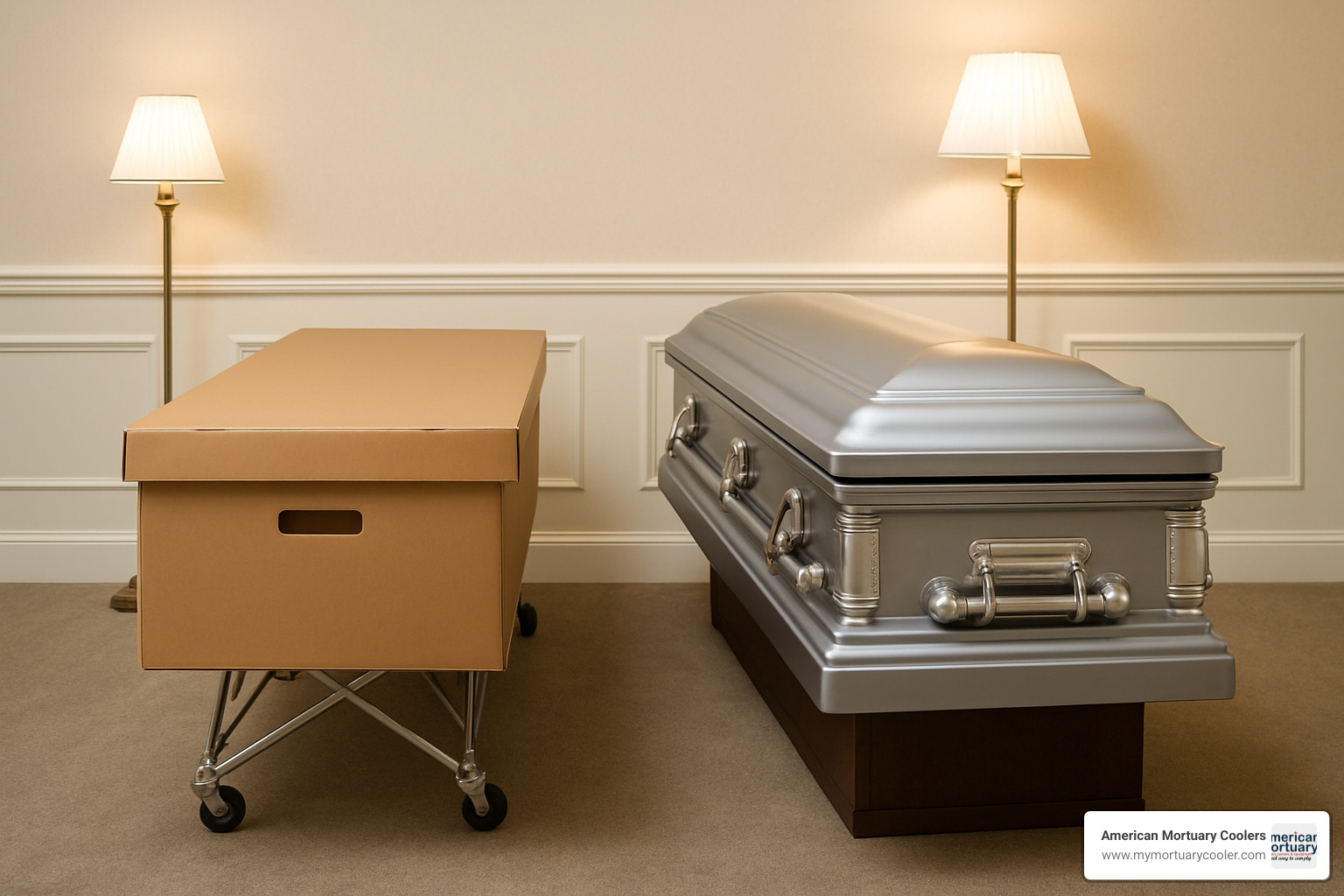
What's exciting about 2025 is how sophisticated these containers have become. Today's alternative containers aren't just plain cardboard boxes. Manufacturers now offer printed woodgrain finishes that look beautiful, Living Memorial® programs that let families add personal photos, and leak-resistant bed liners that ensure safety and dignity throughout the process.
Modern containers also feature reinforced carrying handles that make transport easier for funeral home staff, and custom interior fabrics that can match your rental casket brands for seamless service. Some containers even work double-duty as shipping containers for transportation or as inserts for rental casket systems during viewings.
The minimalist approach appeals to many families who prefer investing their resources in meaningful memorial services rather than expensive caskets that will be cremated.
Why Alternative Containers Are Required
Crematories have strict rules about what can go into their retorts (cremation chambers), and it all comes down to one simple fact: metal doesn't burn. Traditional caskets are loaded with steel handles, hinges, and reinforcement materials that can seriously damage crematory equipment.
From a fuel efficiency standpoint, alternative containers are actually helpful. They burn cleanly and completely, which reduces cremation time, cuts energy costs, and minimizes emissions. The cardboard and reinforced fiberboard construction provides additional combustible material that supports the cremation process.
OSHA handling requirements also make alternative containers the safer choice. These containers typically weigh just 28-40 pounds compared to 200+ pounds for metal caskets. That's a huge difference when your staff is moving containers multiple times a day - it prevents workplace injuries and makes everyone's job easier.
How Alternative Containers Differ from Traditional Caskets
The cost gap tells the whole story. Traditional caskets range from $2,000 to $10,000 or more, while alternative containers typically cost between $0-$315. Many funeral homes include them at no charge with cremation services, which families really appreciate.
Weight differences are dramatic too. A Trayview® 29 Alternative Container weighs just 40 pounds, while a standard steel casket can tip the scales at over 300 pounds. This affects everything from your transportation costs to how many staff members you need for handling.
The combustible materials used in alternative containers are specifically chosen to burn efficiently and completely. Unlike traditional caskets made from hardwoods, metals, and synthetic materials designed to last decades, these containers are engineered for their final purpose.
For ceremony usage, alternative containers can be surprisingly versatile. Many funeral homes use them as inserts in rental casket systems, allowing families to have a traditional viewing followed by cremation.
Materials, Features & Specs That Matter
When it comes to alternative containers, the materials used have come a long way from basic cardboard boxes. Today's containers blend smart engineering with dignified presentation, creating vessels that families can feel good about while meeting all crematory requirements.
Cardboard might sound simple, but we're not talking about Amazon shipping boxes here. Modern cremation containers use specially designed corrugated cardboard that's built to handle real structural loads. The popular TransPorter® series uses printed reinforced fiberboard that maintains its shape and dignity throughout the entire process.
Reinforced fiberboard takes this concept even further. Think of it as cardboard's stronger cousin - multiple layers with different grain directions create surprising strength. Some of these containers can support several hundred pounds without breaking a sweat, yet they still burn completely clean.
For families wanting something more traditional-looking, plywood construction offers the best of both worlds. These wooden containers provide that familiar casket appearance while still meeting all cremation requirements. They're particularly popular when families plan a viewing service before cremation.
Honeycomb cardboard represents the cutting edge of container technology. This ingenious material provides exceptional strength while weighing very little - perfect for oversized containers where you need extra structural integrity without extra weight.
Corrugated plastic serves a specialized role, mainly for shipping applications. While these containers can't be cremated, they're excellent for protecting remains during air transport or long-distance shipping.
The features that separate quality containers from basic models make all the difference for funeral home operations. Leak-resistant liners prevent any fluids from escaping during transport - a crucial safety feature. Pocket handholds built right into the container walls make carrying safer and more dignified than trying to grip smooth surfaces. Reinforced corners prevent those embarrassing structural failures that nobody wants to deal with.
Many containers now offer interior fabric options that provide visual appeal and comfort for families. These aren't just afterthoughts - they're carefully chosen to match rental casket brands and create a cohesive presentation.
| Material Type | Strength Rating | Cremation Efficiency | Best Use Case |
|---|---|---|---|
| Standard Cardboard | Good | Excellent | Basic cremation services |
| Reinforced Fiberboard | Very Good | Excellent | Standard funeral home use |
| Honeycomb Cardboard | Excellent | Excellent | Oversized containers |
| Plywood Construction | Excellent | Very Good | Viewing services |
More info about cremation services
Typical Specifications of Alternative Containers
Most alternative containers follow industry-standard dimensions that work for the vast majority of situations. The standard 80 inches long by 24 inches wide handles most adults comfortably, but manufacturers have expanded their offerings to cover every possible need.
Standard adult containers measure 80 inches long, 24-27 inches wide, and 13-17 inches high. They're designed to handle 300+ pounds safely, which covers virtually all standard cases. These dimensions work well with existing funeral home equipment and crematory systems.
Oversized containers bump the width up to 32 inches while maintaining the 80-inch length. At 17 inches high, they provide extra room and can handle up to 400+ pounds. These containers have become increasingly important as American body sizes have changed over the decades.
Infant and child sizes represent one of the most thoughtful developments in the industry. Manufacturers now offer multiple configurations from 24 inches up to 60 inches, with proportionally scaled widths and heights. Many include specialized interior treatments that provide extra comfort for grieving families.
Weight limits depend heavily on construction methods. Basic cardboard containers typically handle 250-350 pounds reliably, while reinforced fiberboard models can support 400+ pounds without issues. The key is matching container strength to actual needs rather than over-engineering everything.
Interior fabrics have evolved dramatically from the early days of plain cardboard. Basic models include simple non-woven cloth that provides a clean, dignified appearance. Premium options offer ivory crepe, soft velour linings, or even custom fabrics that perfectly match specific rental casket brands for seamless presentation.
Spotlight: TransPorter® & Trayview® Models
The TransPorter® Alternative Cremation Container didn't become the "#1 selling Alternative Container in the United States" by accident. Its success comes from solving real problems that funeral directors face every day. The metal-free design ensures smooth cremation operations, while the pre-assembled construction means you can use it immediately - no assembly required.
What makes the TransPorter® special starts with practical features. The leak-resistant bed liner provides safety and dignity during transport. Five underside pocket handholds give you secure grip points for safe carrying. The non-woven cloth interior creates a presentation that families appreciate.
The variety of design options lets you match different family preferences. You can choose from Woodgrain, Blue, Driftwood, and Pine finishes, each designed to look dignified and professional. Three size configurations - Narrow, Standard, and Oversize - ensure you can handle any situation.
Batesville's Trayview® series represents the premium end of alternative containers. These models integrate beautifully with the Living Memorial® Program, allowing families to add photos and personal touches that make the container truly theirs.
The Trayview® 27 measures 80" x 27" x 13.5" and weighs just 28 pounds - easy for staff to handle safely. The larger Trayview® 29 goes 80" x 32" x 17" at 40 pounds, providing extra space when needed. Both feature printed woodgrain finishes that look surprisingly neat and ivory crepe interiors in the larger models.
A downloadable PDF Litho: Transporter in Blue
Both product lines show how far alternative containers have evolved from basic necessities to thoughtfully designed products. They prove that meeting regulatory requirements doesn't mean sacrificing dignity or family satisfaction.
Sustainability, Cost & Personalization Guide
When families choose alternative containers, they're often making an environmental statement as much as a financial one. The sustainability story here is genuinely impressive, especially when you compare it to traditional burial practices.
Most alternative containers use FSC-certified cardboard, which means the forests they come from are managed responsibly. The manufacturers have gotten smart about adhesives too - they're using biodegradable glues and water-based inks that won't leave harmful residues. When cremation is complete, these containers break down entirely, leaving practically no trace.
The CO₂ savings are substantial. We're talking about 30-40% fewer emissions compared to cremating traditional caskets. Why? Simple - alternative containers burn cleaner and faster, requiring less fuel and shorter cremation times. It's one of those rare situations where doing the right thing for your wallet also happens to be better for the planet.
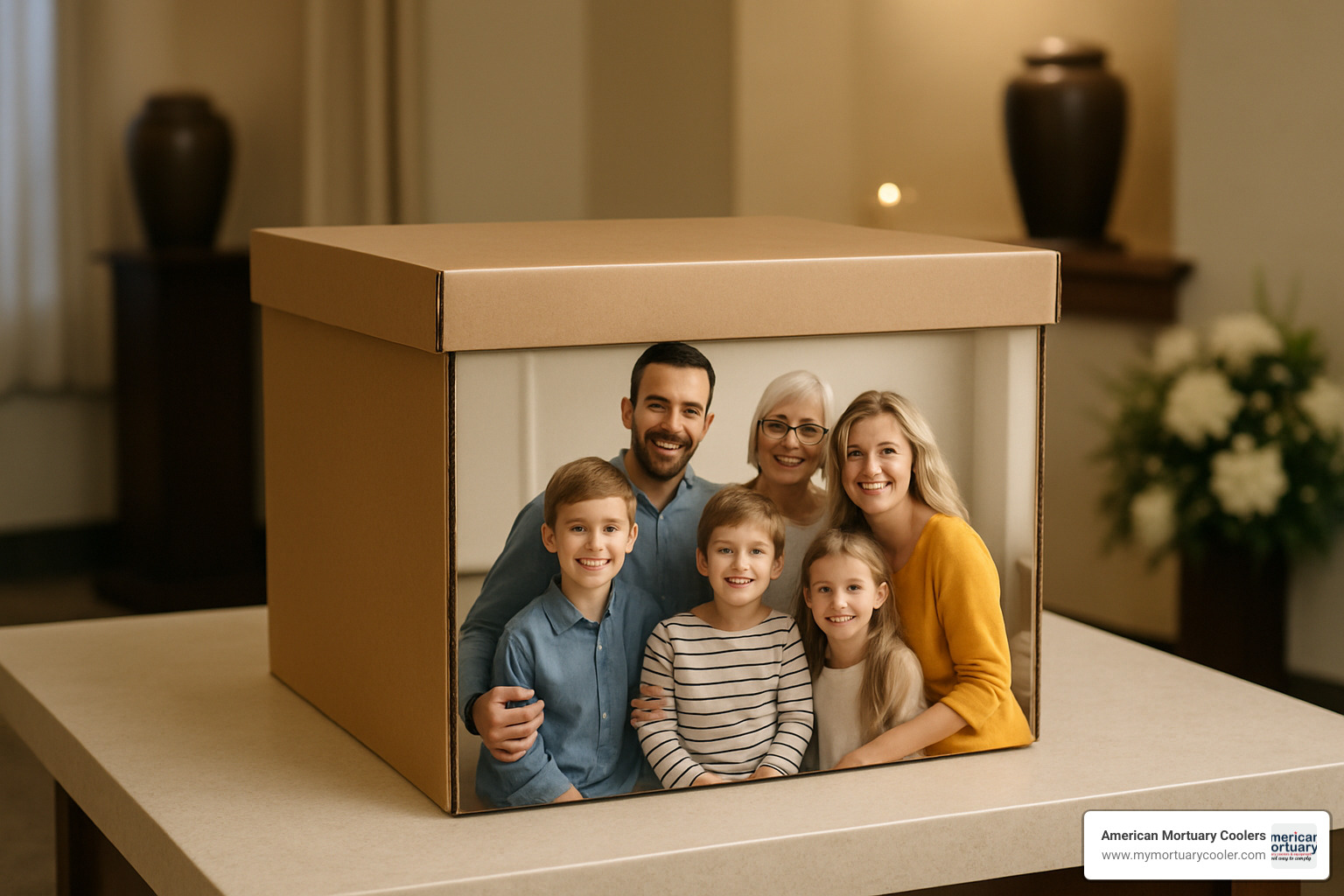
Let's talk money, because that's often what drives the initial interest. Basic cardboard containers are frequently included free with cremation services - that's your $0 option. Mid-range containers with better finishes and features typically run $100-200, while premium containers with personalization options can reach $200-315.
Here's where it gets interesting: the rental option. Many funeral homes use this clever system where families can have a traditional viewing with a beautiful rental casket, but the alternative container inside serves as both the insert and the actual cremation vessel. You get the ceremony you want without the expense of buying a casket that's headed for cremation.
Personalization has come a long way from plain brown boxes. Photo corners let families attach meaningful pictures, while printed woodgrain finishes give you the look of wood without the cost. Some manufacturers even offer custom printing services - we've seen containers with family photos, favorite landscapes, even sports team logos.
An Essential Guide to Choosing the Best Wooden Urns
Are Alternative Containers Environmentally Friendly?
The environmental credentials of alternative containers are solid across the board. When we say they're biodegradable, we mean it - these containers break down completely during cremation, leaving minimal ash residue that gets incorporated into the final cremains.
Recyclability matters too, though it's rarely an issue since funeral homes typically use their entire inventory. But if you ever had unused containers, most can go straight into standard cardboard recycling programs.
The emissions data tells a compelling story. Alternative containers burn at lower temperatures for shorter periods than hardwood caskets, which means less energy consumption and cleaner air. Plus, there's no metal to deal with afterward - no sorting, no recycling, no waste.
Some green burial grounds have started accepting certain alternative containers for direct earth burial because of their biodegradable construction.
Budgeting: Alternative Containers vs. Caskets
The numbers here are eye-opening. A complete cremation package with an alternative container typically runs $1,500-3,000, while traditional burial with a casket can cost $7,000-12,000. That's not just a difference - that's life-changing money for many families.
Upgrade fees are usually reasonable if you want something fancier. Moving from a basic included container to a premium model might add $200-300 to your total. Compare that to upgrading to a traditional casket for cremation, which can tack on $2,000-8,000.
Shipping costs rarely surprise anyone with alternative containers since they're built into cremation packages. The exception is specialized shipping situations - if you need to transport remains by air or internationally, you might see costs of $200-1,200 for specialized shipping containers.
What we've noticed working with funeral homes across the country is that families appreciate having real choices. Some prefer basic containers and put their savings toward memorial services or charitable donations. Others want the premium containers with personalization features.
Regulations, Special Sizes & Shipping Logistics
Shipping remains across state lines or internationally requires specialized containers that go beyond basic cremation needs. Air-tray standards become critical when families need to transport their loved ones via commercial airlines. These aren't your typical alternative containers - they're reinforced vessels designed to meet strict TSA requirements and airline cargo regulations.
The paperwork alone can be overwhelming. Air-tray containers include built-in documentation pockets for death certificates, transit permits, and airline manifests. Without proper container certification, airlines will refuse the shipment, leaving families stranded in difficult situations.
Combo trays solve a common problem for funeral homes that handle both local cremations and long-distance shipments. These hybrid containers function as both shipping vessels and cremation containers, eliminating the need to transfer remains between different containers. It's practical engineering that reduces handling and potential complications.
For international transport, Ziegler cases represent the premium standard. These reinforced containers withstand the rigors of customs inspections, multiple transfers, and international shipping requirements. They're built like small fortresses - necessary when you consider how roughly cargo can be handled during international flights.
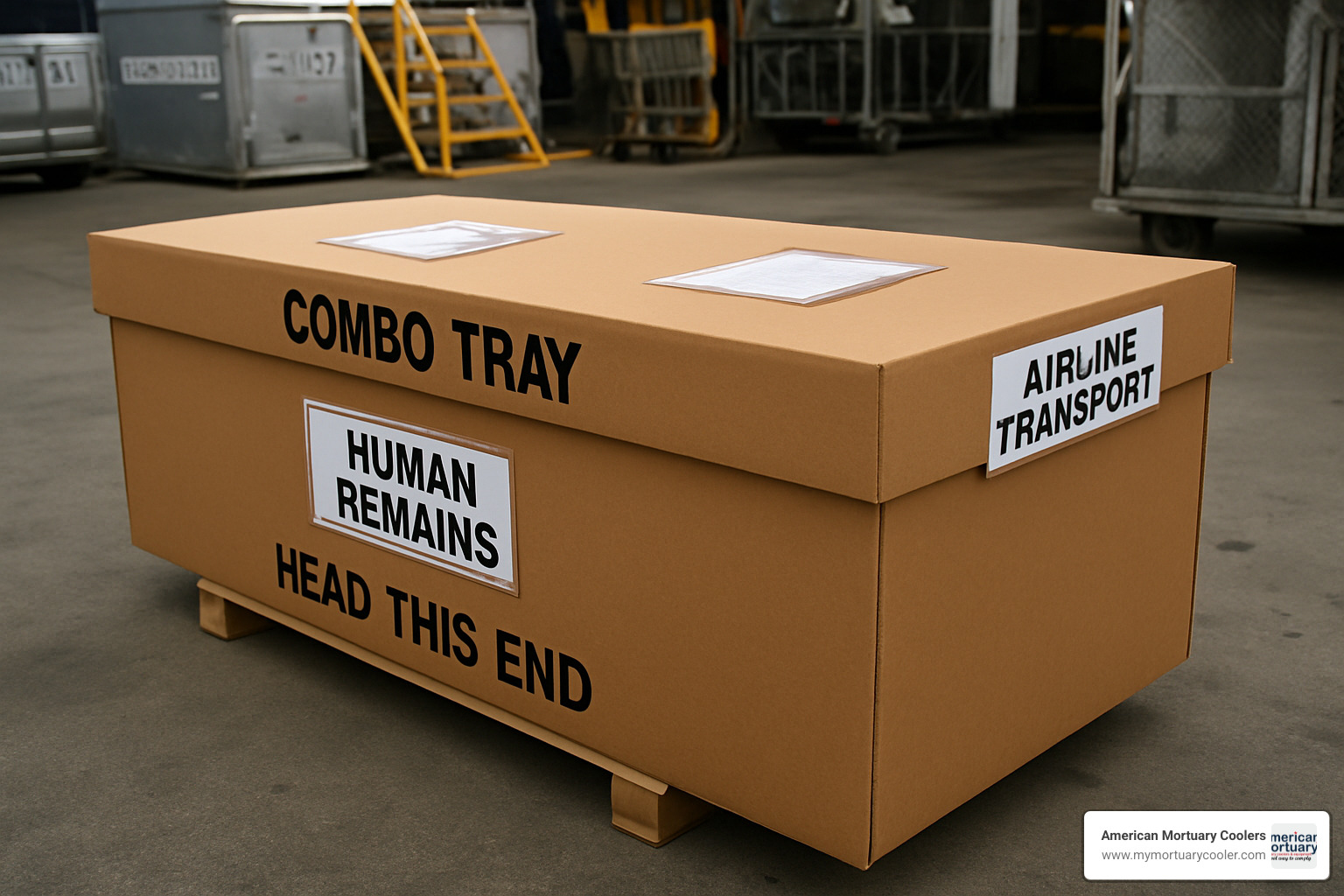
Oversized containers address a sensitive reality - not everyone fits in standard dimensions. These containers typically measure 32 inches wide compared to the standard 27 inches, providing dignity and safety for larger individuals. Some manufacturers offer custom sizing for exceptional cases, though lead times can be longer.
The infant container market requires special consideration beyond just smaller dimensions. These containers often feature improved interior treatments and expanded personalization options. Families dealing with infant loss appreciate the extra attention to presentation details that might seem minor in adult containers.
Pet cremation has emerged as a significant specialized market. Many container manufacturers now offer pet-specific alternative containers in multiple sizes, recognizing that pet families deserve the same dignity and options as human families. The sizing ranges from small containers for cats to large ones for Great Danes.
Latest research on shipping remains
Governance & Certifications
The FTC Funeral Rule provides the legal foundation requiring funeral homes to offer alternative containers. This isn't a suggestion - it's federal law designed to protect consumer choice and ensure affordable cremation options remain available. Funeral homes cannot require casket purchases for cremation services.
CANA recommendations from the Cremation Association of North America provide industry best practices that go beyond legal requirements. These guidelines help funeral directors select appropriate containers and use them safely, covering everything from storage conditions to handling procedures.
ASTM D6251 standards for corrugated boxes aren't legally mandated for alternative containers, but many manufacturers follow these testing criteria anyway. It's quality assurance that ensures consistent performance - nobody wants a container failing during transport or ceremony.
State regulations generally defer to federal FTC requirements, though some states add specific labeling or documentation requirements. The regulatory landscape remains fairly consistent nationwide, which simplifies operations for funeral homes serving multiple states.
Using Alternative Containers for Viewings & Ceremonies
Rental shells transform basic alternative containers into presentation-worthy vessels for family viewings. The alternative container slides inside a traditional-looking rental casket, allowing families to have conventional funeral services followed by cremation. It's an neat solution that provides choice without compromising dignity.
Interior crepe liners make a significant difference in presentation quality. Premium alternative containers often include ivory or colored crepe interiors that provide visual appeal during services. These details matter when families are saying their final goodbyes.
Leak proofing becomes essential for any container used during viewing situations. Quality alternative containers include moisture barriers and absorbent materials to prevent any issues during services. Nobody wants to deal with leakage problems during a family's most difficult moments.
Managing family expectations requires careful communication. Modern alternative containers far exceed the quality of early cardboard boxes, but they're still utilitarian compared to traditional caskets. Clear explanations about appearance and capabilities prevent disappointment and help families make informed decisions.
Frequently Asked Questions about Alternative Containers
What materials are most accepted by crematories?
Cardboard and reinforced fiberboard are the gold standard for crematory acceptance. These materials were literally designed for this purpose - they burn completely, leave minimal ash, and won't damage expensive crematory equipment. Think of them as the cremation industry's favorite fuel.
Wood-based alternative containers also get the green light from most crematories, though there's one important caveat: no metal fasteners allowed. Even tiny staples can cause headaches during cremation, potentially damaging retort equipment or creating safety issues for crematory operators.
The secret sauce is keeping everything metal-free. Reputable manufacturers understand this requirement inside and out, using only water-based glues, cardboard fasteners, and construction methods that crematories trust. When you're working with established brands like TransPorter® or Trayview®, you can be confident they've already solved the crematory acceptance puzzle.
Some crematories are pickier than others about synthetic glues or certain finishes, but these cases are rare. Most facilities welcome any properly constructed alternative container because they actually make the cremation process more efficient.
Can we personalize an alternative container for a memorial service?
The personalization game has completely changed in recent years. Families today can transform a basic alternative container into something truly meaningful without breaking the bank.
The Living Memorial® Program leads the pack here, allowing families to add professional photo displays and custom design elements. But even simpler options can make a huge difference - photo corners let families attach cherished pictures, while printed woodgrain finishes provide visual warmth that cardboard alone can't match.
Custom interior fabrics are another popular choice. Instead of basic non-woven cloth, families can upgrade to ivory crepe or colored linings that coordinate with memorial flowers or family preferences. Some manufacturers even offer custom printing services for families who want something completely unique.
The key is setting realistic expectations. We're not talking about hand-carved mahogany here, but modern alternative containers can absolutely serve as dignified centerpieces for memorial services. Many families are surprised by how meaningful these personalized touches become.
Are alternative containers included in a basic cremation price?
Here's where the FTC Funeral Rule really protects families. Most funeral homes include a basic alternative container at no extra charge with their cremation packages. It's not just good business practice - it's often required by law.
The "basic" part is important though. What you get for free is typically a simple cardboard container that meets all safety and dignity requirements but doesn't include premium features. Think reliable transportation that gets the job done without fancy extras.
Upgrade fees kick in when families want improved features like printed finishes, better interior fabrics, or personalization options. These upgrades usually run $100-300, which is still a fraction of traditional casket costs. Some families choose the upgrade, others prefer to put their money toward memorial services or other priorities.
The smart move is asking specific questions upfront. What exactly is included? What upgrade options are available? Are there any hidden fees for delivery or handling? Transparent funeral homes will walk you through all the options without pressure, helping you make the choice that fits your family's needs and budget.
Conclusion
The journey through alternative containers reveals how far the funeral industry has come in serving families with dignity, affordability, and environmental consciousness. What started as basic regulatory compliance has blossomed into a sophisticated market offering everything from simple cardboard containers to premium personalized vessels.
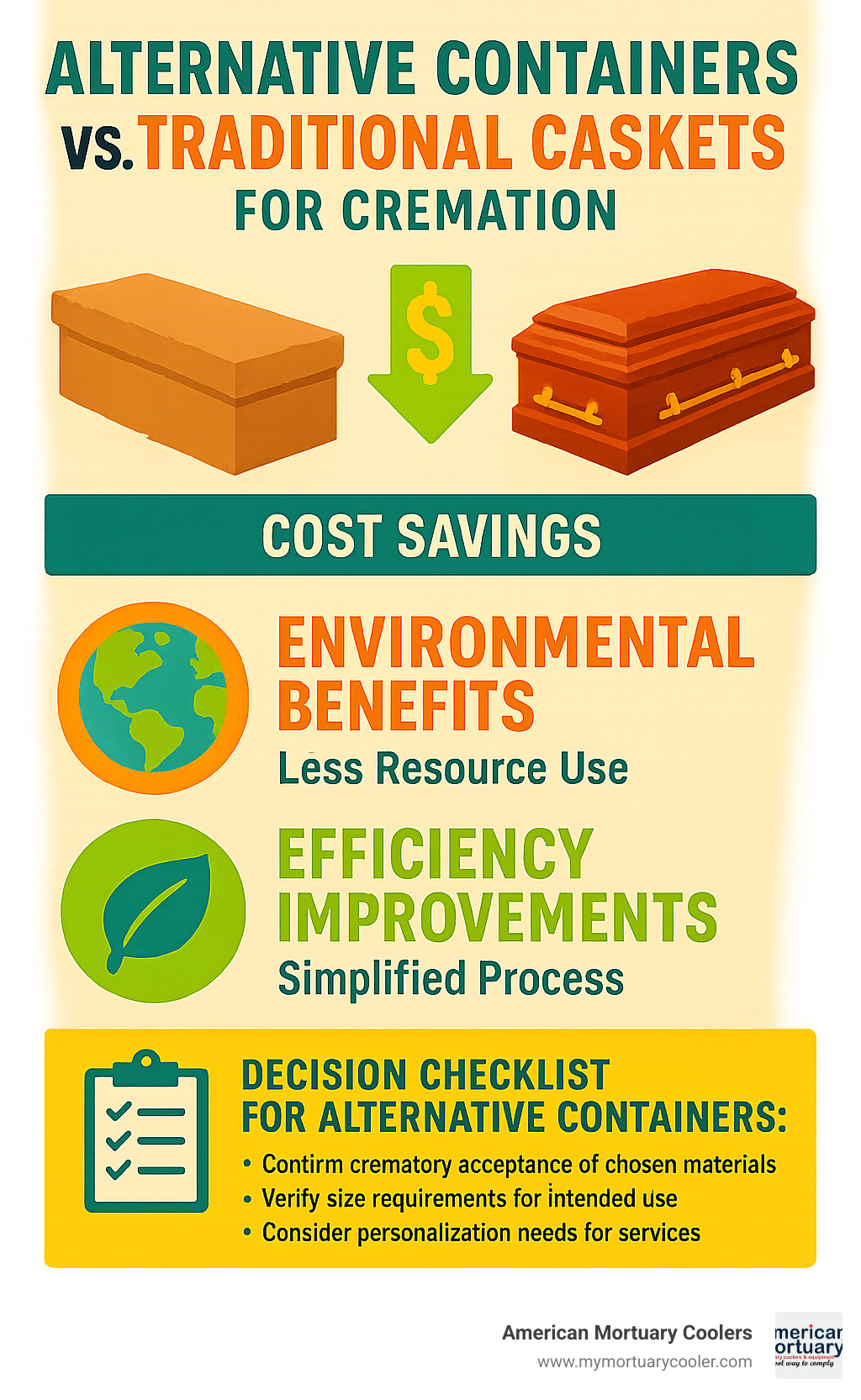
At American Mortuary Coolers, we've watched this evolution unfold while helping funeral homes optimize their operations. Our custom mortuary cooling solutions work hand-in-hand with quality alternative containers to ensure families receive the respectful service they deserve. When you're storing containers before cremation services, proper temperature control maintains dignity and meets health regulations.
The numbers tell a compelling story. Families save thousands of dollars while reducing environmental impact by 30-40%. Funeral homes benefit from lighter handling, faster turnover, and satisfied clients who appreciate having meaningful choices. It's a win-win situation that reflects broader changes in how Americans approach end-of-life services.
Your next steps depend on where your funeral home stands today. Maybe you're already offering basic containers but want to explore premium options with personalization features. Perhaps you're evaluating suppliers or reconsidering your storage and handling procedures. Either way, the key is matching container choices to your community's needs and values.
From our Tennessee facility, we deliver cooling solutions across the contiguous 48 states, supporting funeral homes as they steer these choices. We've seen how the right combination of quality containers and proper storage creates smooth operations and positive family experiences.
The future looks bright for alternative containers. As cremation rates continue climbing and environmental awareness grows, these products will only become more important. Funeral directors who understand the options available in 2025 position themselves to serve families better while building sustainable businesses.
Choosing containers isn't just about meeting FTC requirements or saving money. It's about offering families meaningful choices that align with their values and circumstances. Whether someone selects a simple included container or upgrades to a premium model with family photos, you're helping them honor their loved one in their own way.



















